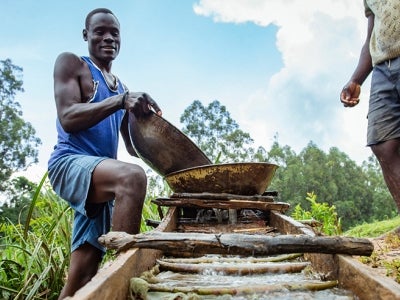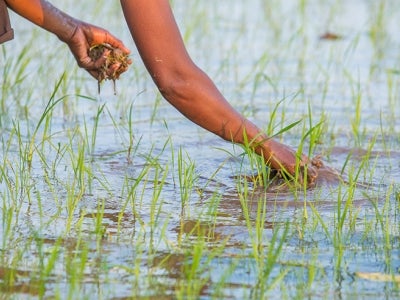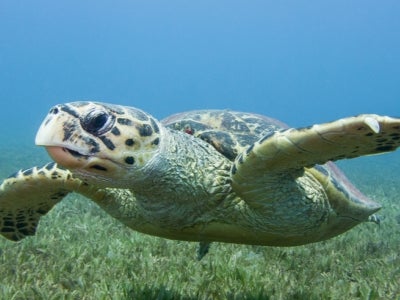The projects presented during the National Dialogue, one of a series that the GEF is holding with countries around the world, aimed to address a vast variety of issues. From restoring forested ecosystems, creating ecological villages in the highlands of Madagascar, to conserving protected areas and species threatened by poaching and illegal wildlife trade. Photo: Christian Hofer/GEF.
In biodiversity-rich Madagascar, which is also one of the poorest countries in the world, an inclusive country-driven dialogue sets the stage for a strong commitment to environmental protection and transformational change.
“Madagascar is the fourth largest island on the planet. Most of the plant and animal species in Madagascar cannot be found anywhere else on Earth,” said Jaime Cavelier, Sr. Biodiversity Specialist at the GEF, explaining the importance of Madagascar for the global conservation efforts. “In the meantime, four out of five Malagasy depend directly on land, water and forests for their livelihoods. With the growing population in the country, this puts a lot of strain on the environment and natural resources in Madagascar,” he continued.
With its natural resource reliant economy, finding and establishing environmentally sustainable and economically viable alternatives to harmful practices such as slash-and-burn agriculture, illegal timber exploitation, and wildlife trafficking will benefit both the people and the environment on the country level as well as at global scale.
"GEF is the main funder and Madagascar's principal technical and financial partner in the protection of the environment and its natural resources.” stated Ms. Christine Edmee Ralalaharisoa, Director General of the Ministry of the Environment and Sustainable Development of Madagascar, and Operational Focal Point of the GEF, opening the Madagascar National Dialogue which took place in March, in the country’s capital Antananarivo.
“In the past,” she continued, addressing the Ministry’s major stakeholders who gathered to work out the course forward in addressing the Madagascar’s pressing environmental issues, “the GEF funds have been instrumental in Climate Change related efforts, and in safeguarding Biodiversity and Protected Areas in the country. This National Dialogue allows me to bring to the table all relevant parties to discuss and create a common vision for projects and programs to be financed in GEF-7 - GEF’s new four-year funding cycle.”
The projects presented during the National Dialogue, one of a series that the GEF is holding with countries around the world, aimed to address a vast variety of issues. From restoring forested ecosystems, creating ecological villages in the highlands of Madagascar, to conserving protected areas and species threatened by poaching and illegal wildlife trade, such as marine turtles and the critically endangered Radiated Tortoise.
Priority projects also included support to local communities through the GEF’s Small Grants Programme, as well as efforts to support the Cartagena Protocol on Biosafety, and the Nagoya Protocol on the use and benefit-sharing of genetic resources. GEF staff also heard about projects on the reduction of GHG emissions, and the use of Mercury and Persistent Organic Pollutants.
Ibrahima Sow, GEF lead for Africa and head of delegation said: “It is important to highlight that the dialogue in Madagascar, the country that is the largest recipient of GEF funds in Africa - US$38.45 million, was the culmination of discussions that had taken place over several months, involving relevant stakeholders from all over the country. Seeing such enthusiasm from a country of this importance to global biodiversity preservation efforts is a great sign that speaks of adequate institutional capacity and political will to implement the policies and measures required to achieve results on the ground.”
Madagascar is also putting forward projects to increase resilience to climate change. These projects range in size from US$2 million to US$8.25 million. Several projects presented during the National Dialogue emphasized biodiversity conservation, including those on the conservation on protected areas and threatened species, and the request for funding to capitalize the Madagascar Biodiversity Fund (Fondation pour les Aires Protégées et de la Biodiversité de Madagascar).
The short video below showcases relevant stakeholders from the National Dialogue discussing the most pressing national environmental challenges and deciding on how to address them with GEF funding.


